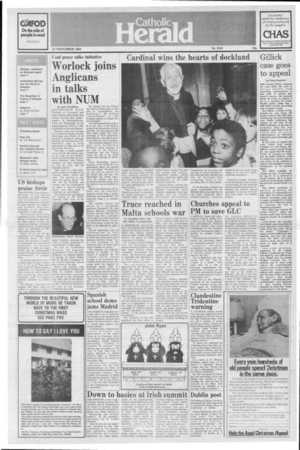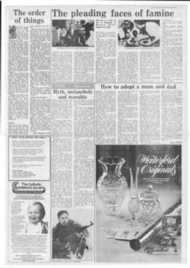Page 1, 23rd November 1984
Page 1

Report an error
Noticed an error on this page?If you've noticed an error in this article please click here to report it.
Tags
Share
Related articles
Church Coal Initiative 'welcomed
Worlock Condemns Coal Intransigence
Mps Debate Worlock Sermon
Review Of 198i
Education Talks
Coal peace talks initiative
Worlock joins Anglicans in talks with NUM
by Jack O'Sullivan ARCHBISHOP Derek Worlock of Liverpool and other leading churchmen met Arthur Scargill and miners' leaders in Bishopthorpe, York on Wednesday in an unprecedented effort to find a solution to the coal dispute.
However, there were no signs of a reciprocal meeting with Ian MacGregor and officials of the National Coal Board, although all along the Churches have left themselves open to being approached by either side in the nine month old strike.
The talks, a closely guarded secret until the last minute, came in the wake of last. Sunday's attack on the Churches by Tory party chairman, John Selwyn Gummer, for theirstatements on the pit strike and the Ethiopian famine.
They come at a time when, said Fr Anthony Churchill of the Catholic Media Office this week, "the situation is very grave and getting worse." He said that the bitterness and violence that has accompanied the return to work by striking miners may have made a settlement yet more distant.
The meeting was convened at the request of the NUM, following offers from all the major Christian &lurches last week to involve themselves in reconciliation if called upon.
As well as Archbishop Worlock, the Anglican Archbishop of York, Dr John Habgood, the Anglican Bishop of Lincoln, Dr Simon Phipps and Dr Bernard Thorogood of the United Reformed Church were present at the talks.
Before the meeting took place, Archbishop Worlock had made the Catholic Church's position quite clear, concerning its attitude to any discussions with either side in the dispute. "The Church is not an amateur ACAS", said the Archbishop at the end of the Bishops' Conference last week. He stressed that the Church saw itself as being open to take part in "reconciliation, not mediation." He defined "reconciliation" as "the bringing together of people who are estranged."
The ball appeared this week to be in the court of the NCB to propose any discussions with the churches. No such approach had been made earlier this week, according to NCB spokesman, Keith Beeston, who said he knew of no plans for such a meeting.
This situation seemed to be at odds with Archbishop Worlock's recent statement at the end of the Bishops' Conference that the Church would not talk to the NUM without also hearing the NCB's case.
Peter Heathfield, geperal secretary of the NUM was very enthusiastic about the meeting this week saying: "We shall state our case, and our concerns for the future and the fact that MacGregor has turned topsyturvy the systems that have prevailed in British mining since the industry was nationalised in 1947."
Before the meeting he did not think that the Churches' initiative would bring a speedy settlement but stressed that "the important thing is to establish contact."
The Catholic Church has insisted on a non-partisan approach throughout the long dispute. However, Archbishop Worlock said last week that the Church may have a particular role to play in a strike involving a nationalised industry, because the Government would be less likely to be impartial in such a case.
Church spokesmen from all denominations hit back following Mr Gummer's sermon in which the Conservative party chairman said that bishops "can no more pontificate on the economies than the Pope could correct Gallileo on physics."
The statement was primarily directed at bishops of the Church of England, but the Catholic Church reacted strongly to his accusation that Cardinal Hume had got his facts wrong about the logistics of Ethiopian famine relief. Fr Churchill said this week that all the Church had advised was that action had to be taken. Speaking ar
for Cardinal Hume, he said "Our point was that something had to be done. And the Hercules planes duly went there. So what is Mr Selwyn Gummer on about?"
blog comments powered by Disqus











